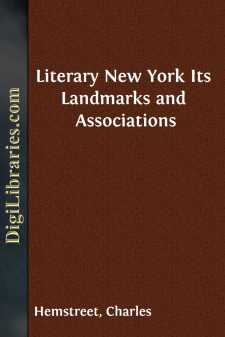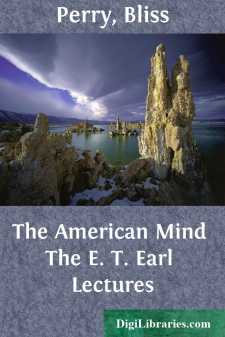Literary Criticism
- American
- Ancient and Classical 3
- Asian 1
- Australian & Oceanian 1
- Books & Reading 8
- Caribbean & Latin American 2
- Drama 2
- English, Irish, Scottish, Welsh 49
- European 7
- General 37
- Horror 1
- Humor 2
- Jewish 2
- Medieval 2
- Middle Eastern 3
- Poetry 7
- Renaissance 6
- Russian & Former Soviet Union 1
- Shakespeare 27
American Books
Sort by:
CHAPTER I. THE COLONIAL PERIOD. 1607-1765. The writings of our colonial era have a much greater importance as history than as literature. It would be unfair to judge of the intellectual vigor of the English colonists in America by the books that they wrote; those "stern men with empires in their brains" had more pressing work to do than the making of books. The first settlers, indeed, were...
more...
"THE POET OF THE NIGHT" "I am a Virginian; at least, I call myself one, for I have resided all my life until within the last few years in Richmond." Thus Edgar A. Poe wrote to a friend. The fact of his birth in Boston he regarded as merely an unfortunate accident, or perhaps the work of that malevolent "Imp of the Perverse" which apparently dominated his life. That it...
more...
Chapter IWriters of New Amsterdam THERE is a fashion nowadays of trimming the fronts of brick houses by placing black bricks among the red in such a way as to form odd and unique designs. It is an attractive way of doing, for it varies the staid simplicity of the solid color. But for all it may seem original and new, it is a style that had its beginning long, long ago, even in the days when the...
more...
by:
Bliss Perry
I Race, Nation, and Book Many years ago, as a student in a foreign university, I remember attacking, with the complacency of youth, a German history of the English drama, in six volumes. I lost courage long before the author reached the age of Elizabeth, but I still recall the subject of the opening chapter: it was devoted to the physical geography of Great Britain. Writing, as the good German...
more...
I think that every man ought to work for his living, without exception, and that when he has once avouched his willingness to work, society should provide him with work and warrant him a living. I do not think any man ought to live by an art. A man's art should be his privilege, when he has proven his fitness to exercise it, and has otherwise earned his daily bread; and its results should be free...
more...
by:
Mark Twain
It seems to me that it was far from right for the Professor of English Literature in Yale, the Professor of English Literature in Columbia, and Wilkie Collins to deliver opinions on Cooper's literature without having read some of it. It would have been much more decorous to keep silent and let persons talk who have read Cooper. Cooper's art has some defects. In one place in...
more...
by:
Bliss Perry
CHAPTER I. THE PIONEERS The United States of America has been from the beginning in a perpetual change. The physical and mental restlessness of the American and the temporary nature of many of his arrangements are largely due to the experimental character of the exploration and development of this continent. The new energies released by the settlement of the colonies were indeed guided by stern...
more...
by:
Louise Manly
PREFACE. T primary object of this book is to furnish our children with material for becoming acquainted with the development of American life and history as found in Southern writers and their works. It may serve as a reader supplementary to American history and literature, or it may be made the ground-work for serious study of Southern life and letters; and between these extremes there are varying...
more...
My recollections of Bret Harte begin with the arrest, on the Atlantic shore, of that progress of his from the Pacific Slope, which, in the simple days of 1871, was like the progress of a prince, in the universal attention and interest which met and followed it. He was indeed a prince, a fairy prince in whom every lover of his novel and enchanting art felt a patriotic property, for his promise and...
more...
I have already spoken of my earliest meetings with Lowell at Cambridge when I came to New England on a literary pilgrimage from the West in 1860. I saw him more and more after I went to live in Cambridge in 1866; and I now wish to record what I knew of him during the years that passed between this date and that of his death. If the portrait I shall try to paint does not seem a faithful likeness to...
more...











